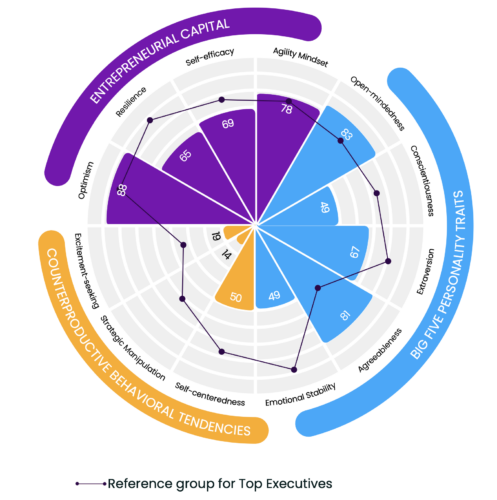The Charisma Trap: Why Shiny Leaders Don’t Shine in Crisis

In the first few weeks of this year, 222 CEOs resigned. A record since surveys began in 2002 and 14% more than in the previous year. What is particularly alarming is that 19% of successors were only appointed on an interim basis, compared to just 6% at the start of 2024.
These figures are not just a symptom of political uncertainty, but an expression of a deeper problem: HR professionals often choose the wrong personality types when hiring executives. The fascination with charismatic, extroverted candidates leads to personalities with high self-presentation skills reaching top positions – often at the expense of character and substance.
The lure of first impressions
The Childhood Leadership Study of 2025 already showed that in 96% of classes, children with a strong self-expression are chosen as leaders. This pattern continues in professional life. Charismatic candidates shine in job interviews, appear self-confident, inspiring and present convincing visions. Meta-analyses confirm this: Especially in application and selection processes with strangers, such personalities are systematically preferred.
Charles O’Reilly from the Stanford Graduate School of Business warns:
“We see the 10% of self-promoters who succeed and call them visionaries. We ignore the 90% who fail and do damage.”
This effect reminds us of fast, aggressive brands like Shein or Temu: shiny promises, quick wins, but often with unseen costs and long-term damage.
Introverted beats loud
Studies confirm that introverted CEOs are more successful in the long term than their extroverted colleagues. These quieter leaders make more considered decisions and act more sustainably. Nevertheless, many selection processes still favor the opposite: loud, shiny, extroverted.
The short-term effect is tempting, and yes, sometimes legitimate in terms of quick success: A charismatic candidate can, for example, inspire stakeholders, generate momentum and attract media attention. In the long term, however, they often lack strategic depth, genuine team orientation and the ability to maintain calm and foresight even in difficult phases. Impulsive decisions or risky prestige projects lead to higher fluctuation, declining trust and often to financial losses and damage to the company’s image. In the medium term, the initial “gain” turns into a painful “pain” for the entire organization.
The true cost of bad hires
According to McKinsey and Kienbaum, bad hires in management positions can cost up to three times the annual salary. For C-level roles, these losses quickly add up to millions. In addition, there are serious follow-up costs that are difficult to measure: toxic corporate cultures, increasing fluctuation, risky takeovers or manipulated share buybacks.
All of this not only reduces company performance, but also jeopardizes the trust of employees, investors and markets, with long-term consequences for reputation and competitiveness.
Young executives in constant self-promotion mode
Our 2021 study for Harvard Business Manager with almost 10,000 German participants shows that self-promotion-oriented tendencies are widespread among German managers. Young executives are particularly likely to succumb, exacerbated by social media and the trend towards personal branding. Three critical patterns stand out: excessive self-centeredness, impulsive risk-taking behavior and strategic manipulation to assert one’s own interests. These developments clearly show how important alternative selection methods are for companies.
AI instead of gut feeling
Traditional assessments are reaching their limits here. They are usually based on self-assessments, a playing field in which self-promoters are particularly adept. NLP-based analyses (Natural Language Processing) take a different approach: they work with candidates’ open text responses and uncover unconscious language patterns that allow conclusions about key personality dimensions. This makes manipulation much more difficult, while at the same time providing a deeper, more objective assessment.

Such approaches not only help in the selection of new leaders, but also in the further development of existing top managers. They provide a sound basis for coaching, succession planning and long-term cultural development that goes far beyond mere recruitment decisions.
Character as a competitive advantage
Companies that rely on objective, technology-supported personality analyses at an early stage gain more than just security when filling key roles. They create a corporate culture in which character, integrity and long-term thinking count. This creates a real competitive advantage: teams work together with greater trust, strategic risks are reduced and the retention of key performers increases.
In the end, it’s not about devaluing charisma. Rather, it is about combining it with character, substance and foresight. This is the only way for companies to ensure that their managers not only shine in good times, but also provide orientation, create trust and ensure stability in times of crisis.
Prof. Dr. Florian Feltes
Prof. Dr. Florian Feltes is co-founder and co-CEO of zortify and a forerunner in AI-supported HR innovation. Together with his team, he develops intelligent personality diagnostics and helps companies identify the perfect candidates—without expensive assessments and without bias. His vision: a world in which every company can effortlessly form high-performance teams and create work environments that allow human potential to flourish.


The best teams are not made up of clones!

If your CHRO is still counting heads, you’re already losing the best ones!
